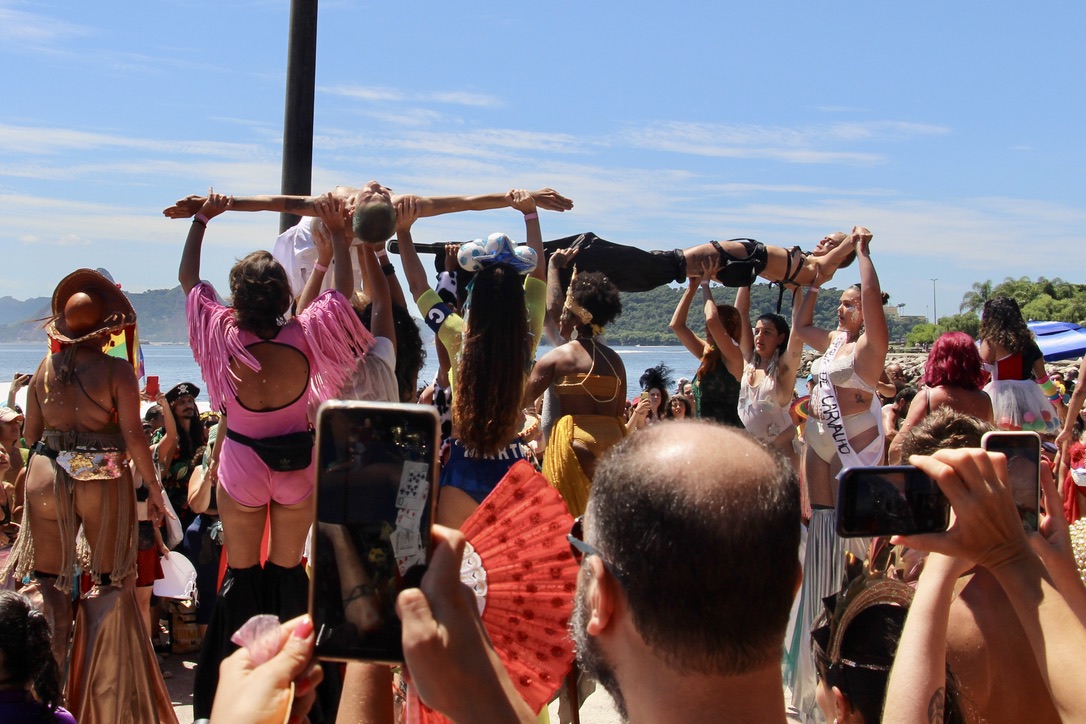This February 22, 2023 in the morning, the Aterro de Flamengo, a popular park on the carioca coast, vibrates to the sound of trumpets and xequerês. Perched on a pair of stilts and wrapped in a vagina disguise, Regina sways her hips rhythmically, a few beads of sweat beading her shaved head. The Belgian designer is part of the bloco Mulheres rodadasa group of badass women who fight against stereotypes and machismo during the Rio Carnival.

With an orchestra composed of percussion and brass, this bloco – a sort of musical association whose purpose is to perform in public space – reinterprets Brazilian classics. The stilt walkers complete the picture by linking pirouettes and choreography. Men can play, but in the minority. ” Carnival is about reclaiming the street, and it’s all the more symbolic as a woman », Regina insists. She arrived in Brazil a year ago, she quickly discovered the culture of the carnival and fell in love with it. “The atmosphere is much more pleasant between girls, we help each other, we support each other, always with kindness”explains the woman who in the meantime has decided to give lessons, to pass on the art of handling stilts to other women.
See this post on Instagram
From social networks to the streets of Rio
The genesis of this feminist project is a macho post posted on the internet in 2014. In the shared photo, a man carries a sign claiming to be “deserves better than a mulher rodada”. The phrase ” mulher rodada », difficult to translate into French, expresses the idea of a woman who has had a large number of sexual partners. In short, slut-shaming. Exasperated, the journalists Débora Thomé and Renata Rodrigues, friends for more than twenty years, decide to found a block by posing as ” mulher rodada “. A re-appropriation of a sexist term and a real snub to the male chauvinism present on social networks. The two accomplices decide to exploit the latter to their own advantage. They calmly create an event on Facebook. And the success is immediate: 1000 participants in only 24 hours After a few phone calls to musician friends, Rio’s first feminist bloco performs on the streets of Cariocas.

The declared objectives are multiple: to put feminist issues in the foreground and to allow the participants to express themselves artistically in a space free from prejudices. “Many join our bloco to learn an instrument”, says Débora Thome. This is the case of Belu, a 31-year-old Argentinean astronomer. After following the bloco’s adventures on Instagram for four years, he decided to start once the pandemic passed. “At first I was a little embarrassed because I hadn’t played the saxophone for a long time. I was afraid of not being good enough. The good news is that I was wrong”, he laughs, wearing a headband decorated with a planet. For the last year you have attended classes every Friday night. “The main idea is to have fun and not be afraid to make mistakes. Don’t know the notes? Dance, sing, laugh »explains the musician, who has gained self-confidence thanks to these moments of exchange.

Sisterhood and political messages
During Mulheres Rodadas performances, the snippets of overheard conversations are a joyful cocktail of Portuguese, Spanish, French or Italian. This bloco is a way to (re)find a space of sisterhood and community for newly arrived foreigners in the Marvelous City. And the public wants more. ” It’s a different block because it highlights some serious issues like femicides, while maintaining a festive context. »rejoices Eve, 36, a Mexican architect for whom this is the first carnival. An early fan, Claudia, 56, has never missed a performance of Mulheres rodadas. “Here we see the bodies of working women, normal bodies, bodies that go beyond the usual standards of femininity”notice this professor who lives in the suburbs of Rio, stamping her foot.

In the public, made up of people of all ages and genders, it is not uncommon to see rainbow fans. ” It is essential that the carnival represents minorities, women, black people, LGBTQI+ peoplenon-binary people, trans people”, points out Kelly, 38 years old. On her shoulder, a sticker marked ” Have you been told no? Respect this decision covers a thin layer of gold glitter. The Rio writer says she let a tear slip during her powerful retelling of “Geni eo Zeppelin.” In this 1979 cult song, Chico Buarque tells the tragic fate of a trans prostitute.

For almost three hours, the pieces follow one another and the block ends in a joyful cacophony, each musician improvising a few notes before the crowd disperses. For many participants, this edition of the carnival tastes like a newfound freedom, after a period marked by Covid-19 and four years of Bolsonarism considered particularly sexist. But Débora Thome insists, ” patriarchy doesn’t end with the end of the previous government, the feminist struggle continues ».
The playlist of original music played during the blockade
A photo credit: Anais Richard.
Source: Madmoizelle
Mary Crossley is an author at “The Fashion Vibes”. She is a seasoned journalist who is dedicated to delivering the latest news to her readers. With a keen sense of what’s important, Mary covers a wide range of topics, from politics to lifestyle and everything in between.



